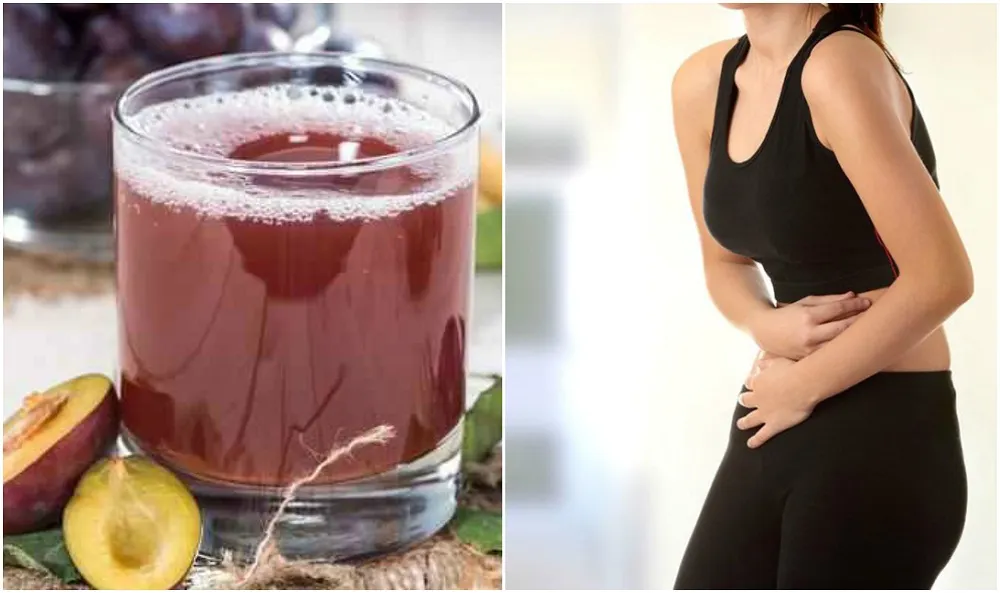The 6 Best Fruits to Fight Constipation

We could define chronic constipation as a delay or difficulty in defecation that’s present for at least two weeks and is of sufficient intensity to cause significant discomfort.
On the other hand, chronic functional constipation is a generic term that encompasses a group of disorders that are associated with persistent problems with defecation. This includes if the number of times is low, expulsion is difficult or incomplete, and if this occurs without evidence of the existence of a structural or biochemical problem.
So, when it comes to the second type of constipation, there are fruits that could help fight constipation. Find out what they are in this article!
What is constipation and how to fight it?
If we stick to the medical definition of the term constipation, as mentioned above, we could say that it’s the inability to regularly evacuate the intestines or the necessity for a greater effort to do so. In other words, we suffer from this problem when we can’t go to the bathroom normally.

The unbalanced evacuation of the intestine can cause annoying consequences such as, for example:
- A feeling of heaviness
- Swelling
- Headaches
- Flatulence
- Hemorrhoids
- Fissures in the anus
- Diverticulosis
- Pain when going to the bathroom
You might find this interesting: Ten Healthy Foods to Regulate Your Digestion
For us to receive a medical diagnosis of constipation, bowel movements must be less than three per week. However, a diagnosis also depends on the size and consistency of the stool. This problem can be chronic or occasional and depends on our habits more than any other cause.
Guidelines to fight constipation
A good diet is essential so that we can evacuate our bowels properly every day or every other day. However, all dietary changes must be accompanied by lifestyle changes.
Here are some tips:
1. Avoid processed food
Fast food, flour, and white sugars cause many problems in the body. One of them is the difficulty to go to the bathroom properly. That’s why it’s important to avoid them as much as possible if you suffer from constipation.
2. Exercise to fight constipation
Walking, jogging, swimming…These are just some of the many options at your disposal. Don’t forget that constipation worsens with a sedentary lifestyle.
3. Choose oil for seasoning
It has been proven that olive oil acts as a perfect lubricant for the stool in the colon. A spoonful on an empty stomach can be very useful, too.
4. Eat yogurt to fight constipation
The probiotics and other healthy bacteria in this dairy product improve intestinal health and function.
5. Drink plenty of water
You’ve probably heard the phrase “at least 8 glasses per day” thousands of times. However, there’s a good reason for this: drinky plenty of water is extremely necessary for the body. It’s also necessary for us to be well hydrated to go to the bathroom properly.
6. Eat a diet rich in fiber
Whole grains, seeds, legumes, fruits, and certain vegetables are rich in fiber. However, due to their astringent properties, the following foods should be avoided:
- Rice
- Cheese
- Ppastries
What are the best fruits to fight constipation?
As you have read before, you need to consume a good amount of fiber if you want to say goodbye to bowel movement problems. Don’t hesitate to go to the supermarket or market and buy the following fruits. Apart from the fact that they could help you overcome constipation, they’ll also encourage you to eat healthier and enjoy a tasty dessert or snack!
Let’s take a look.
1. Kiwis
This small brown and green fruit has a high fiber content. It helps to improve bowel function thanks to an enzyme called actinidin (which also helps the digestion process and reduces gas production).
One of the most effective ways to take advantage of the kiwi properties of kiwi is to eat the fruit on an empty stomach every day. If you don’t like its flavor (it is quite distinct, after all) you can combine it with oranges in a juice or smoothie for breakfast.
2. Plums: The most popular fruit to fight constipation
It’s very advisable to consume this fruit to be able to go to the bathroom well. It’s a natural remedy to treat constipation that has been known for many years. Dried or fresh plums are an excellent source of fiber, both soluble and insoluble.

Meanwhile, the sugar it contains provides a mild laxative effect and promotes water retention in the intestines to complete the process of stool formation. In addition, it helps to protect the mucous membranes and to stimulate the work of the colon.
3. Oranges to fight constipation
The citric acid provided by this fruit makes it a good natural alternative to dissolve the residues that have accumulated in the intestine. At the same time, it helps the body to:
- Eliminate liquids
- Regulate intestinal transit
- Fight constipation
Of course, this is all without taking into account all of the other properties it has since this fruit contains an excellent dose of vitamin C. It is recommended to drink freshly squeezed orange juice on an empty stomach.
You might find this interesting: Orange Blossom Water – A Natural Remedy for Skin Care
4. Pears
This fruit is an excellent ally to treat bowel problems. In addition to being rich in fiber, pears contain pectin, a substance that regulates bowel movements and the purification of the body.
Want to know more? This fruit can even help strengthen the immune system and protects us from high blood pressure.
5. Figs to fight constipation
The nutritional properties of figs are a little unknown. However, it’s recommended to eat figs to fight constipation.
Their laxative effects facilitate evacuation. Plus, since they’re easily digestible, they protect the stomach and can prevent problems such as heartburn or reflux.
6. Berries are also good for constipation
Finally, these delicacies couldn’t be missing from our list of fruits to help with constipation! Berries have antioxidants that can improve not only intestinal transit but also digestion.
Among some of the best options, we find:
- Strawberries
- Blackberries
- Blueberries
- Cherries
Finally, remember that if the problem persists, you should see your doctor to rule out any other problem that may be affecting your health.
All cited sources were thoroughly reviewed by our team to ensure their quality, reliability, currency, and validity. The bibliography of this article was considered reliable and of academic or scientific accuracy.
- Asakura, K., Masayasu, S., & Sasaki, S. (2017). Dietary intake, physical activity, and time management are associated with constipation in preschool children in Japan. Asia Pacific Journal of Clinical Nutrition. https://doi.org/10.6133/apjcn.112015.02.
- Bae, S. H. (2014). Diets for Constipation. Pediatric Gastroenterology, Hepatology & Nutrition. https://doi.org/10.5223/pghn.2014.17.4.203.
- Benítez González A. Manejo de la constipación funcional en la infancia. Correo Científico Médico. Diciembre 2017. 21 (4).
- Cunillera O. Improvement of functional constipation with kiwifruit intake in a Mediterranean patient population: an open, non-randomized pilot study. Revista Española de Nutrición Humana y Dietética. 2015. 9 (2).
- Department of Human Services, & Sciences. (2011). Fibre in food. Better Health, Deakin University.
- Food Data Central. Avocados, raw, california. U. S. Department of Agriculture. Abril 2019.
- Manzano C, Estupiñán D, et al. Efectos clínicos de los probióticos: qué dice la evidencia. Revista Chilena de Nutrición. Marzo 2012. 39 (1): 98-110.
- Mayo Clinic. Estreñimiento. Octubre 2021.
- National Institute of Diabetes and Digestive and Kidney Diseases. Estreñimiento. U.S. Department of Health and Human Services. Mayo 2018.
- Navarro Ruiz S, Val Jiménez C, et al. Frecuencia de estreñimiento en pacientes de atención primaria. Revista Clínica de Medicina de Familia. Febrero 2015. 8 (1).
- Ötles, S., & Ozgoz, S. (2014). Health effects of dietary fiber. Acta Scientiarum Polonorum, Technologia Alimentaria. https://doi.org/10.17306/J.AFS.2014.2.8.
- Suares N. C, Ford A. C. Systematic review: the effects of fibre in the management of chronic idiopathic constipation. Alimentary, Pharmacology and Therapeutics. Abril 2011. 33 (8): 895-901.
- Urquiaga I, Echevarría G, et al. Origen, componentes y posibles mecanismos de acción de la dieta mediterránea. Revista Médica de Chile. Enero 2017. 145 (1).
- Wang J, Hong Huang J, et al. Banana resistant starch and its effects on constipation model mice. Journal of Medicinal Food. Agosto 2014. 17 (8): 902-7.
This text is provided for informational purposes only and does not replace consultation with a professional. If in doubt, consult your specialist.








